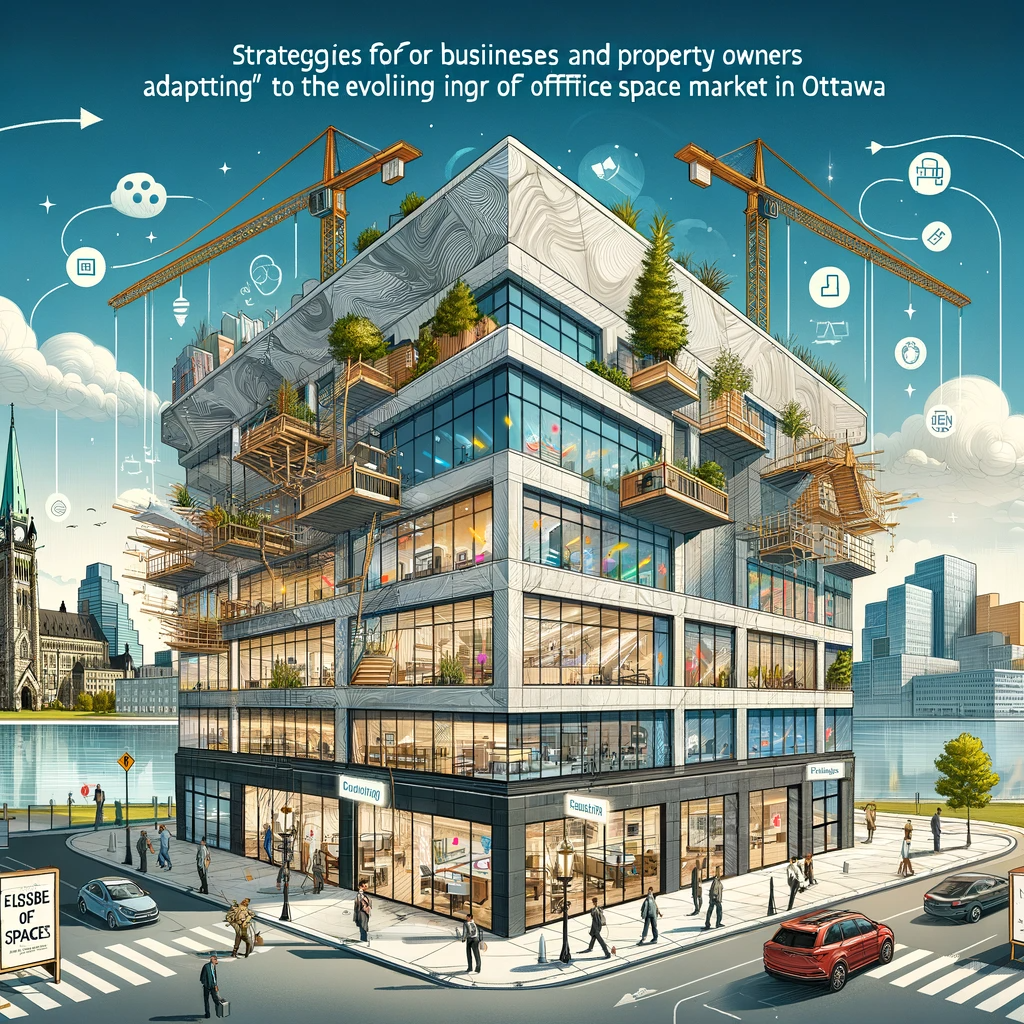Ottawa's Office Space Revolution: Adapting to Hybrid Work and Flexible Arrangements
In the heart of Canada's bustling capital, a quiet revolution is unfolding within the office spaces of Ottawa. Long known for its stable market, predominantly influenced by the public sector, the city is now at a crossroads, reshaping its identity in response to the evolving demands of the modern workforce. This article delves into the dynamic changes sweeping through Ottawa's office space landscape, spurred by the widespread adoption of hybrid work models and the public sector's shift towards more flexible working arrangements.
As we navigate through this transformation, we witness a significant impact on vacancy rates, leasing dynamics, and the very fabric of office space utilization—particularly in downtown Ottawa. From traditional office setups to innovative, flexible spaces accommodating the new hybrid work culture, Ottawa's office space market is not just adapting; it's reinventing itself. Join us as we explore this evolution, its implications for businesses and property owners, and the future trajectory of office spaces in Canada's capital.

Ottawa's Office Space Landscape
Ottawa, the capital city of Canada, has long been characterized by its stable and predictable office space market. Dominated by government buildings and public sector offices, the city's landscape has traditionally been a tapestry of conventional office setups. However, recent years have seen a seismic shift in this landscape, driven by the advent of hybrid work models and the public sector's exploration of flexible working arrangements.
The onset of the COVID-19 pandemic served as a catalyst for this transformation. Businesses and government agencies alike were compelled to reimagine their working environments virtually overnight. As a result, remote work, once a niche option, became a widespread reality. This shift didn't just change where people worked; it fundamentally altered the perception and utility of office spaces.
In the wake of this change, Ottawa's office space demand began to evolve. Organizations started to question the need for large, traditional office spaces, considering the efficiency and practicality of remote work. This shift is particularly noteworthy in a city where the public sector is a major occupant of office spaces. The government's inclination towards adopting flexible work arrangements signifies a major turning point for Ottawa's office market.
As hybrid work models become more ingrained, the nature of office space in Ottawa is undergoing a remarkable transformation. Businesses are now seeking smaller, more versatile spaces that can accommodate flexible working schedules. This has led to an increase in demand for office spaces that can offer hot-desking, shared workspaces, and amenities that support a hybrid work environment.
This shift has significant implications for both the design and location of office spaces. There's a growing trend towards the decentralization of office spaces, moving away from the traditional downtown cores. This decentralization is driven by the desire to reduce commute times and to provide employees with more convenience and flexibility.
Moreover, the design of office spaces is evolving to meet the new demands of a hybrid workforce. Open-plan layouts, collaborative spaces, and technology-enabled meeting rooms are becoming the norm. These changes are not just about physical space; they're about creating an environment that fosters collaboration, flexibility, and productivity.
In summary, the office space landscape in Ottawa is experiencing a renaissance. Driven by the adoption of hybrid work models and the public sector's shift towards flexible arrangements, the city's office market is adapting to meet the needs of a modern workforce. This evolution presents both challenges and opportunities for businesses, property owners, and employees, signaling a new era in the way we think about and utilize office spaces.

Hybrid Work Models and Their Influence on Office Space Demand in Ottawa
The integration of hybrid work models has been a game-changer for the office space market in Ottawa. This new approach to work, blending remote and in-office activities, is reshaping how businesses view their space requirements. The impact of this shift is multi-faceted, affecting everything from the size of office spaces to their layout and location.
Shift in Space Requirements: One of the most immediate effects of hybrid work models is the change in space requirements. Businesses are increasingly opting for smaller, more flexible office spaces. The rationale is straightforward: with a portion of the workforce working remotely at any given time, the need for large, permanent workstations diminishes. This trend is leading to a decrease in the average size of office leases.
Design and Layout Changes: The design of office spaces is also undergoing a significant transformation. There's a growing preference for designs that accommodate both collaborative and individual work. This means more open spaces for teamwork and smaller, private areas for focused tasks. These changes are not just about aesthetics; they represent a fundamental shift in the way work is conducted.
Technology Integration: Another key aspect of this transition is the increased reliance on technology. Modern office spaces are being equipped with advanced communication tools to facilitate seamless collaboration between in-office and remote workers. High-speed internet, video conferencing facilities, and digital collaboration tools are becoming standard features of the modern office.
Location Preferences: The preference for office locations is also evolving. With the flexibility of hybrid models, employees are less bound to the downtown core, leading to a rise in demand for suburban office spaces. This shift is driven by factors like reduced commute times and the desire for a better work-life balance.
Impact on Real Estate Market: These changes are having a profound impact on Ottawa’s real estate market. While the demand for traditional office spaces is declining, there's an uptick in demand for flexible, tech-enabled spaces. This shift presents challenges and opportunities for developers and property owners, who must adapt to the changing needs of businesses.
Hybrid work models are significantly influencing office space demand in Ottawa. As businesses adapt to this new way of working, the office space market is evolving to meet these changing needs. This evolution is not just a response to a temporary trend but a sign of a permanent shift in the way we work and use office spaces.

The Changing Face of Downtown Ottawa's Office Market
Downtown Ottawa, traditionally the heart of the city's office market, is undergoing a remarkable transformation. This change is being driven by the evolving preferences and requirements of businesses in light of the hybrid work model. Let's explore how this shift is impacting vacancy rates, leasing dynamics, and the overall character of downtown Ottawa's office spaces.
Increased Vacancy Rates: One of the most visible impacts of the shift to hybrid work is the rise in vacancy rates in downtown Ottawa. With more companies adopting flexible work arrangements, the demand for large, centralized office spaces has diminished. This trend is leading to an increase in vacant office spaces, particularly in buildings that have not adapted to the changing needs of businesses.
Leasing Dynamics: The leasing market in downtown Ottawa is also feeling the effects of this shift. There's a growing preference for shorter, more flexible leases, as businesses are hesitant to commit to long-term arrangements in an evolving work environment. This trend is pushing property owners to rethink their leasing strategies, offering more adaptable terms to attract and retain tenants.
Transformation of Office Spaces: In response to these changes, downtown Ottawa is seeing a transformation in its office spaces. Traditional office buildings are being reimagined to cater to the needs of a hybrid workforce. This includes redesigning spaces to be more flexible, integrating advanced technology, and creating environments that support both in-person and remote collaboration.
Impact on Downtown Economy: The changing office space dynamics in downtown Ottawa have broader implications for the area's economy. With fewer people working in the downtown core on a daily basis, businesses that rely on office workers, such as restaurants and retail stores, are adapting to this new reality. This situation is prompting a rethink of the downtown area's economic model and its reliance on office workers.
A New Vision for Downtown: Despite these challenges, there's also an opportunity for downtown Ottawa to reinvent itself. This could include a shift towards mixed-use developments, where office spaces coexist with residential areas, retail, and leisure facilities. Such a transformation could lead to a more vibrant, 24/7 downtown area, diverging from the traditional 9-to-5 office-centric model.
Downtown Ottawa's office market is in a state of flux, adapting to the realities of the post-pandemic world and the growing adoption of hybrid work models. This evolution presents both challenges and opportunities, signaling a significant shift in the way downtown areas function and thrive.

The Future of Office Spaces in Ottawa
As Ottawa's office space market continues to adapt to the hybrid work model, it's crucial to look ahead and consider what the future may hold. This section explores the potential long-term changes and trends that could shape the office space landscape in Ottawa.
Sustainable and Smart Offices: One of the key trends likely to gain momentum is the focus on sustainability and smart office designs. Eco-friendly materials, energy-efficient systems, and green spaces are expected to become integral components of office spaces. Additionally, the integration of smart technology for better building management and enhanced employee experience will be a priority.
Flexibility and Scalability: Future office spaces in Ottawa will likely place a greater emphasis on flexibility and scalability. This means spaces that can easily be reconfigured to suit different needs and team sizes. The concept of ‘space as a service’ might become more prevalent, where businesses can customize and scale their space usage based on real-time requirements.
Hybrid-Friendly Designs: As hybrid work becomes a staple, office designs will continue to evolve to support this model. This includes creating spaces that seamlessly blend physical and digital work environments. Expect to see more tech-enabled meeting rooms, virtual collaboration spaces, and areas designed for both concentration and collaboration.
Decentralization and Diversification: The trend towards decentralization may continue, with businesses spreading out from the downtown core to suburban and even rural areas. This shift could lead to a more diversified office market, with different types of spaces emerging in various parts of the city.
Community and Well-being Focus: The future of office spaces in Ottawa might also see a stronger focus on community and employee well-being. Spaces that promote social interaction, mental health, and physical wellness will be crucial. This could include more communal areas, wellness centers, and amenities that encourage a healthy work-life balance.
The future of office spaces in Ottawa looks to be dynamic and responsive to the evolving needs of the workforce. As we move forward, these spaces will likely become more than just places to work; they will be environments that foster innovation, collaboration, and well-being.

Strategies for Businesses and Property Owners
As Ottawa's office space market evolves, it's important for both businesses and property owners to adapt strategically. This section provides guidance on how they can navigate these changes effectively.
For Businesses:
- Embrace Flexibility: Businesses should consider adopting more flexible work policies and office layouts. This includes creating spaces that support both collaborative and independent work, and investing in technology that facilitates remote collaboration.
- Rethink Space Usage: Companies should evaluate their space requirements in light of hybrid work models. This might mean downsizing, or restructuring existing spaces to be more multifunctional.
- Focus on Employee Experience: Creating an office environment that prioritizes employee well-being and productivity is essential. This includes ergonomic designs, wellness facilities, and spaces that encourage social interaction.
For Property Owners:
- Adapt to Market Demands: Property owners need to recognize the shift towards flexible and hybrid-friendly spaces. This might involve renovating traditional office spaces to meet the new demands.
- Offer Flexible Lease Terms: In a rapidly changing market, offering flexible lease terms can be more attractive to potential tenants. This includes options for shorter leases and scalable space arrangements.
- Invest in Technology and Sustainability: Modernizing office spaces with smart technology and sustainable features can increase their appeal. This includes energy-efficient systems, high-speed internet, and smart building management.
Looking Ahead: Both businesses and property owners in Ottawa need to stay ahead of the curve to thrive in this evolving market. By being proactive and responsive to these changes, they can turn the challenges of today's office space market into opportunities for tomorrow.
As we witness the evolving office space demand in Ottawa, it's clear that adaptability, innovation, and a focus on the human element of work are key to success. By embracing these strategies, businesses and property owners can navigate this new landscape effectively and create spaces that are not only functional but also inspiring.
"The Evolving Office Space Demand in Ottawa: Adapting to Hybrid Work and Flexible Arrangements" has taken us on a journey through the changing landscape of Ottawa's office space market. From the shift towards hybrid work models to the transformation of downtown Ottawa’s office scene, we have explored how these trends are reshaping the way businesses and property owners think about workspace.
The future of office spaces in Ottawa is poised to be more dynamic, flexible, and responsive to the needs of a modern workforce. As we have seen, this evolution is not just about physical spaces but also about embracing new ways of working that prioritize flexibility, technology, and well-being. The challenge for businesses and property owners lies in adapting to these changes, transforming challenges into opportunities for growth and innovation.
As Ottawa continues to navigate these uncharted waters, one thing is clear: the office space market in the city is not just adjusting to a new normal but is at the forefront of a workplace revolution. This revolution is setting the stage for a more sustainable, connected, and human-centric approach to work and office design.
In conclusion, the evolving office space demand in Ottawa reflects a broader shift in our understanding of work and the environments we create for it. By embracing change and focusing on adaptability, Ottawa's office space market is well-positioned to thrive in this new era of work.
If you want to discuss the purchase or leasing of commercial office space in Ottawa, call Roch St-Georges at 613-889-7732, email, or book a video or phone call here.





